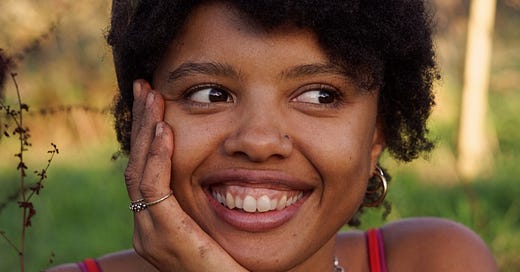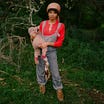Poppy Okotcha: “I'm stepping away from describing my heritage in terms of colour”
The ecological grower and author on culture over colour, finding things she never knew she'd lost and being palatably political
Hi, welcome back to Mixed Messages! This week’s guest is author and ecological grower Poppy Okotcha, who is of mixed-Nigerian and white British heritage. A former model (and sister to past Mixed Messages guest Rosie Okotcha,) Poppy’s debut book, A Wilder Way, is a beautiful year-long memoir of her relationship with her garden. Weaving in Igbo and Celtic folklore, the book serves as an exploration of Poppy’s dual heritages, as much as a story of setting down roots and becoming embedded in nature. Read Poppy’s story below, and check back for something special later in the week.
How do you describe your identity?
I am mixed white-British and Nigerian. On my father's side, we come from the Igbo tribe in the southeast of Nigeria. My mum and her family are all West Country folk from Somerset, Devon and Cornwall.
Growing up in London, it’s super multicultural and I was very much connected with both my mum and my dad's sides of the family.
You spent time living in South Africa growing up – what was that like as a mixed-race family?
It’s not a white majority country but it was so fresh out of Apartheid. We were a mixed-race family spending British pounds, which meant that we ended up being in fairly white-dominated social circles. I also went to a Steiner school, which was white-dominated too. So although I was in a country full of people that looked somewhat like me, our social circles weren't that way and I was absorbing the dynamics around me.
My mum would be asked if we were adopted when she was out with us. Even if my dad was there, they'd still ask because they wouldn't assume that they were together, even though [my sister and I] look the spitting image of both of them.
Strangely, none of that led me to feel at odds with myself. Maybe coming to South Africa with a British accent and British culture meant that I felt different to everyone anyway, and maybe that shielded me from the political dynamics that were going on. When we moved to Wiltshire in the UK, I was already familiar with being around white people, so the culture was more of a shock than my ethnicity.
Over the years, as I'm getting more curious and exploring my relationship with my racial identity and my heritage, I'm stepping away from describing it in terms of colour. It does a disservice to the reality that culture was the thing of value. It’s only recently something that I have consciously thought about.
How have you connected to your culture over time?
Food and land are the two primary ways I feel connected to the cultures on both sides. The way I came to land was through food so it’s through being in the kitchen and smelling both smells, the egusi and the lasagne, that made me want to understand how to grow food.
Music, too, South Africa was full of music. There’s a quote from the president of free South Africa in my book which talks about how the resistance has never not been singing and dancing, and that culture is absolutely central to political resistance. Dad also used to play Nigerian music in the car and my mum sings a lot, so I guess the soundtrack to my life's been quite varied.
I love how your book shows your connection to gardening and the land from both sides of your culture. Is that something you grew up feeling?
I did not grow up knowing it at all, which is funny because my dad is a really spiritual guy. It turns out, he doesn’t know a great deal about it. My grandma knew some, but the missionaries were coming through hard in her generation so many people willingly converted to Christianity. It’s only been picked up again more recently by our generation.
It was a really emotional experience unearthing it, I felt like I was finding something that I didn't know I’d lost.
You mentioned earlier that the Black Lives Matter resurgence triggered some difficult emotions in you – can you expand on that?
It felt really traumatic, powerful and important, but as a mixed race-person, I couldn't figure out how I fit into it. I felt like the discussions I was seeing on social media were surface level and weren't necessarily speaking to the lack of connection that I was experiencing.
I now realise that's because the conversation was very USA-centric, Black versus white. What I was really craving was a conversation about the eradication of culture in the name of empire. For me, that's where I find so much incredible depth and richness, in unearthing the actual culture and not just talking about skin colour.
One of the biggest failings of our time is this obsession with binary categorisation. When I talk about culture as the way I interface with the world, nobody can tell me I’m not who I am. It's not so clean cut. It’s exchange and it’s history.
You used to model, something you’ve stepped away from in recent years. Was colourism something you were conscious of at that time?
Yes and no. It was that lost in translation thing, because conversations between the UK and US are so different. I was doing a lot of work that was being shown to a US audience. The first time I went to New York for work, people were like “yeah, sister, power to you!” when they saw my afro. I never fully comprehended how politically important or significant it was.
Really, my career as a model was what it was because of my afro. People were so moved by the fact I wore it, but that wasn’t intentional. It was really interesting for me realising the privilege that I held, that I could go around wearing my hair in an afro style without it being intentionally political.
Retrospectively, I realised that part of the success of my career in America was down to the fact that I was somewhat palatable. I'm pale-skinned but I had my afro, so I was just the right amount of political for a Black audience and just the right amount of white to be palatable to other people as well.
I didn’t set out for the book to be so much of an exploration of my mixed-race experience. It was quite an emotional process, I grappled with a lot of questions that I've had my whole life and I’ve learned a lot.
It's a lot to deal with that your inherent identity is such a political move and power play for brands.
It grosses me out. I'm just me. All these layers get projected onto you, it’s such a weird thing. I recently changed my hair from my mini afro to locks and I started trying to explain online why I'd done that. Then I was like, “you know what, let me not.” It’s just Black women's hair.
Are there any conversations about mixed identity that you're tired of hearing?
To be honest, I actually don't care. Any conversation is good. I'm just obsessed with the fact that people even mention the mixed experience at all. As long as people are curious and open, I'm here for it.
How did your family raise you to talk about mixed identity? How does that compare to the way you’re raising your son?
There just wasn't a conversation when I was growing up. It was just a different time, I don't think they realised that there needed to be a conversation. My dad used to put a lot of emphasis on the importance of staying connected to Nigeria, but not from a mixed-race angle. He couldn't quite comprehend that it was more complicated than just, ‘Nigeria is your home.’ I've never even been there. I would really like to ensure that my son has a feeling of connection to both of our heritages.
Would you like to go to Nigeria?
Absolutely. For a long time, it was all about South Africa, that felt like home. I was gearing up to go over to Nigeria before COVID, but I had a bit of a block. My relationships with that side of the family haven't always been great – that's part of the mixed-race experience as well, all these different cultures colliding in you and the people that they're connected to. Nigeria is not just Nigeria, Nigeria is my dad. There's definitely that fear of going to Nigeria and people being like, ‘who are you, where are you from?’
What’s the best thing about being mixed for you?
I feel so lucky to have been exposed to all the food. I have an open-minded tolerance too, which primes and prepares you to be capable of holding less binary ways of thinking because your life doesn’t look that way. That's really valuable.
Can you sum up your mixed experience in one word?
Complex, in a beautiful, sometimes challenging and confusing way, but certainly in an enriching way.
Get your copy of A Wilder Way here. Next week, I’ll be speaking to Deepa Paul, the author of Ask Me How It Works: Love In An Open Marriage. Subscribe to get Mixed Messages in your inbox on Monday. Shop Mixed Messages tote bags and bookmarks on Etsy now!
Enjoy Mixed Messages? Support me on Ko-Fi! Your donations, which can start from £3, help me pay for the transcription software needed to keep this newsletter weekly, as well as special treats for subscribers. I also earn a small amount of commission (at no extra cost to you) on any purchases made through my Bookshop.org and Amazon affiliate links, where you can shop books, music and more by mixed creators.
Mixed Messages is a weekly exploration of the mixed-race experience, from me, Isabella Silvers. My mom is Punjabi (by way of East Africa) and my dad is white British, but finding my place between these two cultures hasn’t always been easy. That’s why I started Mixed Messages, where each week I’ll speak to a prominent mixed voice to delve into what it really feels like to be mixed.












